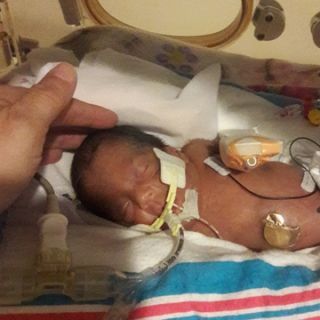
God healed her heart, and people are noticing
By a diaspora outreach worker — Saturday around 2 p.m., I got a serious call from the doctor treating Baby S, who was born 16 weeks early to a refugee family near Atlanta. "I know the parents were here this morning, but can you get them back here quickly? She's not doing well." I asked him bluntly if he was expecting her to go. He said, "Right now, that's a very real possibility. Please get them to hurry."
I called someone closer to take them immediately, and then I battled traffic to get there as fast as I could. When I arrived, scrubbed in, and got to the NICU, baby’s mom ran into my arms sobbing. I looked over at Baby S and was shocked! I had just seen her the day before and she was fine. Now she was sickly yellow grey, and as time went on she became more and more grey. Her kidneys had shut down. She had only peed a slight amount on Friday night, and nothing since.
The doctor got an interpreter on the phone and sadly told the parents that with the kidneys failing, the heart wall was thickening, and there was little they could do.
We called for prayer. We cried. We prayed. We sent out a request for anyone available in the local area to come to the hospital to pray. Honestly, my faith was so small that I really just wanted a few extra sets of arms available to hold us when she died.
I asked the NICU nurses if the group coming could meet in a side room so we would not worry other parents arriving for visits — but instead they allowed the prayer team to come in and surround Baby S in her incubator.
Baby S lay grey and grimacing and twitching. The team began to pray. We did not pray in turns or even always audibly. We prayed in English, German, and sometimes just quiet, desperate cries of "please Jesus." After an hour, the team filed out so that the nurse could do her job.
The nurse opened the bed, and began to care for Baby S. As she opened the diaper, I heard a quiet, "She peed!" The nurse helping her repeated it, and they checked again. "Yes, she really peed!" Word spread around the nurses’ station, and shoulders slumped slightly, relaxing tension. She peed!
Her color began to change, slowly, slowly, less grey, until finally she was pink again. The parents watched. I watched. The nurses watched. She relaxed. No more grimacing. She wiggled more – she’s always been a feisty baby!
At 6:30 p.m., they asked us to leave for change of shift. I went to visit two other babies born that day. When I was done, shift change was over, so I went back to the NICU to see Baby S. She was resting peacefully, and the nurse said, "She peed again, a significant amount!"
At 1:30 a.m., I phoned in again. "She peed again. She's looking good. Her blood pressure is stable. Get some sleep."
Before church, I phoned in again. "She peed all through the night. We repeated her blood gasses and she's not in metabolic acidosis anymore."
God is good.
I texted baby’s mom the news, and she said "Thank you for prayers." That thank you is for all of you. A few representatives stood around her bed, but there was an army before God pleading for this tiny baby's life.
To me, it is so much more than the life of a child, as dear as she is to us. It is the name of our God. The community is talking about how God healed her heart. I told God that afternoon, "Do not let your name come to dishonor. You have set your name on her, and these unreached people are watching."
Keep praying. Baby S is fragile. God is showing his might, but also his tender loving care. And pray for us. The NICU is both an emotional rollercoaster and an endurance race all in one. Throw in a few near misses and miracles, and it's a lot to go through. But we are resting in God and our eyes are on him.
Additional Posts




